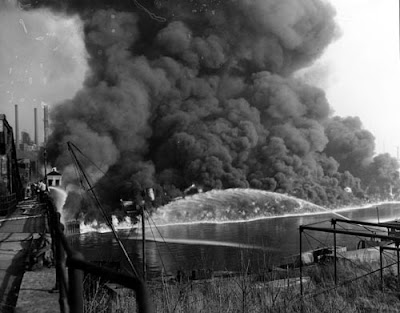Rothbardian wrote:Fair enough. Then when I point out the contradictions in your arguments as applied to your position as a statist, being a rational empiricist you will surely correct your position.
That's pretty funny. You have no idea what you're saying.
The hysteria this faux article caused lead to the epa the way that putting batter in the oven leads to a cake.
To use your cake metaphor, it was rather more like the egg that went in the cake batter.
I know that they were attributed to the 1969 fire, but they were taken in 1952. That was, in fact, my point.
So, how many people are you going to accuse as part of the conspiracy to hide... what, that you think the river didn't catch on fire? That the public shouldn't have been tired of the river catching fire? What is this grand conspiracy of your supposed to do.
If you think the conspiracy was about hyping up the need for environmental laws, how the fuck do you think that a story about a river fire was going to do that without pre-existing public demand for environmental regulations? Your vision of reality here is a sensationalist one, where you somehow seem to think that a shadowy cabal of reporters was single-handedly responsible for creating a mass public demand for environmental regulations. Which is absurd on its face. Precisely how many photographers do you believe were involved in your conspiracy?
Some people were, they were called environmentalists. And the reason they had to go to creating something like the EPA is because the average person wasn't as hysterical as they were. Hence, almost blatant lies like what happened in 1969.
I'm sorry, but you simply do not understand what you're talking about.
It kept catching fire because it was a disgusting mess since the government took it over in the 1800's. The point is, and perhaps I need to use smaller words to get the point across, the state of the river had been improving WITHOUT THE EPA OR ANY INTERVENTION FROM ANY KIND OF GOVERNMENT.
I'm sorry, but you're being contradictory here. You say it had been getting better, and you say "the government" (meaning the Ohio state government) had taken it over, and you say that the government had nothing to do with it getting better. One of those three positions has got to be a lie. And even then, what the hell does the Ohio state government managing the river have to do with the EPA, which is a federal agency?
That's obviously not working since the government is still the #1 polluter.
The government is also the world's #1 economic firm, so that's to be expected. The US state and federal governments do far, far more work than any other group of related organizations on Earth, so it's not surprising that they create a lot of pollution in the process. We could say that just about the federal government on its own, I think. No private company even comes remotely close to the amount of activity done by the US federal government, so the fact that none of them pollute more is not really very surprising.
You're basically saying that an organization performing many times the work of a smaller organization ought to pollute much less than the smaller organization, even when they both have to follow the same environmental regulations. And you're holding that bit of logical absurdity up as an example of the government not following its own environmental regulations? That is nonsensical. You are expressing a basic failure of logic. If two organizations have to follow the same environmental regulations, and one does many times the work of the other, you
would expect the dramatically larger organization to pollute more. Expecting otherwise would be as stupid as expecting, say, Intel to limit itself to the emissions generated by a small mom and pop retail store. It's a basic misunderstanding of the scope involved.
That rhetorical bit--that the government is the #1 polluter--may impress people who do not understand the scale and scope of the difference between the government and its next largest competitor, but it does not impress me, because I know that its next largest competitor isn't even remotely close in scale.
You claim to adhere to reality rather than bias, yet can you acknowledge this basic fact? Why is it so difficult? The government is the biggest polluter, by far. We're talking about mountains to anthills when comparing the state to private industry.
And any private industrial organization is an anthill compared to the productivity of the state. So holding them up for comparison is stupid. It's not just silly, it's stupid and disingenuous.
I'm not sure if you're creating a strawman here or you are just ignorant. In a private system, there's no government to protect the corporation from property damage, and that includes damage to your body.
Oh, alright, in a fully private system without even the courts, the people pursuing damages get told to fuck off and don't even get an unjust settlement. You're right; in a
completely private system, the company just uses its private security services to protect itself against looting by the people who've been damaged, so the people who were injured get nothing. In a private system, there is nothing to compel the corporation to even make the most basic of restitution, so they provide no restitution at all.
I am laughing so hard right now at how silly this is.
It is darkly humorous, isn't it?
As a rational empiricist myself, I view the government as what it is, a group of people who claim a monopoly on violence.
Then you're not a very rational empiricist, since you rely on an ideological view of the government rather than a real view.
Due to government laws, polluting industries and businesses were protected from being sued into oblivion and instead had to worry about a $10 fine for over polluting.
Even if we accept your disingenuous hyperbole, that is $10 more than they would worry about under a private regime, where they would have no reason to pay anyone restitution--let alone damages.
There's actually a simple objective standard: how much harm did your pollution due to my property?
So of course your healthy liver is worth only $250,000... Environmental damage does not confine itself to easily enumerated damages. You cannot assess real objective valuation to things like a child's well-being. Or, I suppose you could, but that would not really be any form of just compensation.
The government claimed ownership of the river and then protected polluters from repercussions. Yet you have this odd sort of god-stuck awe of the state as if it is of some sort of impeachable moral integrity and simply incapable of ever causing harm to anything.
Note; I believe the state should not exist. You are literally telling someone who thinks the state ought not exist that he has a god-struck awe of the state. You
do not know what you're talking about, however, so that's probably to be expected.
Actually all anarchists do is take practical and moral concepts,
You are
not an anarchist, because you believe in a government that does things like protect property rights, and manages courts. Your entire argument here rests on a notion that you have property, that it has an objective value, that you can recover damages to that objectively valued property through courts, etc. You are not an anarchist, you are a statist, even if you might like to dress that statism up in the fancy clothes of a "rights management agency" rather than "government".
and apply them equally to the group of people you'd call the state as well as the results of their actions, rather than put them on some kind of mental pedestal and alternate kneeling and bending over for them, as the deities they clearly are.
That's a laugh, really it is. You do none of these things.
That's because pollution is a problem.
Unless you have a permit.
Then, it's okay.
Spoken like someone who has no clue.













 You can ask anyone who's taken an Ecology 101 class about the importance of
You can ask anyone who's taken an Ecology 101 class about the importance of 





 Therefore, it is my sincere hope that you stay with us here on PoFo and afford us the opportunity for reasonable, polite discussion.
Therefore, it is my sincere hope that you stay with us here on PoFo and afford us the opportunity for reasonable, polite discussion.

 - By wat0n
- By wat0n - By Potemkin
- By Potemkin